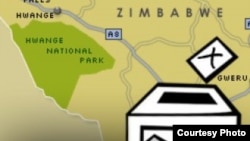The Election Resource Centre says Zimbabwe must reform the Political Parties (Finance) Act as it disadvantages smaller parties that fail to garner significant votes in national polls.
In an article published in its Electoral Reform Series, the organization says it is normally difficult for these parties to get at least 5 percent of the vote as stipulated in the law in order to access state funds.
It says opposition parties, in Africa in general, are normally in a weaker position compared to incumbent political parties, a situation that creates an uneven playing field.
Election Resource Centre director Tawanda Chimhini says this is not good for democracy.
Zimbabwe’s political parties finance law prohibits foreign funding and is based on the proportional funding model used in countries like Tanzania and Zambia.
Under this model, the total amount of money provided is distributed to each political party in proportion to the number of votes or seats won. Zanu PF and the Movement for Democratic Change formation led by Morgan Tsvangirai are currently the only beneficiaries.
HYBRID MODEL
The other finance schemes are the equitable and hybrid models. In the equitable model used in nations like Burundi, funds are distributed equally to the political parties, regardless of the election results. Countries like Mozambique and Tunisia use these two models.
The Election Resource Centre says the government “should reform the Act so that it espouses the hybrid model for financing of political parties in Zimbabwe. The hybrid model … allows new parties to flourish.”
It says the reformed Political Parties (Finance) Act should have mechanism of safeguarding the abuse of state resources against mushrooming political parties inspired by access to public finances.
“The safeguarding can be in the form of having those registered political parties providing evidence of minimum membership in order to access indirect finances” under the Act.”
It further says public financing could be directly or indirectly allocated to political parties. “Under the hybrid system, the legislation should guarantee equitable indirect public financing consisting of different benefits such a tax exemptions; free and equitable access to public media, public premises for campaign activities or meetings, public spaces for the posting of campaign materials and free or subsidized transport or postage.”
COMPETITIVENESS
The organization believes that indirect financing works well in countries with limited financial resources, as is the case in most African countries. “Furthermore, those parties with at least 5% of the vote from the previous election should receive direct funds proportionate to the number of votes received from the total votes cast. This will encourage competitiveness of political parties beyond just revering in registration and minimum membership in order to access finances under the Act.”
The Election Resource Centre recommends that as Zimbabwe is enmeshed in the process of aligning existing regulations to conform to the recently adopted constitution, “it is indeed a great opportunity to re-look at the Political Parties (Finance) Act with a view of bringing fairness and transparency to the flow of money to political entities.”
It says such moves have the potential to minimize conflict by thereby legitimizing triumphant political parties at every electoral event.





